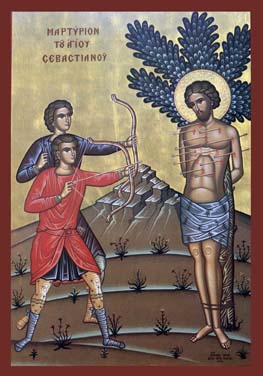St Sebastian, the
martyr
 The
Praetorian guard of the Imperial Palace of the Roman Empire
was an elite group culled from many applicants thoroughly
screened for their loyalty to the emperor and for their
extreme courage. In the third century one of these stalwart
protectors of the emperor was a fearless young officer named
Sebastian of Milan who coupled his loyalty to the emperor
with an even greater devotion to the Saviour, a dual nature
he was able to assume under one regime but which cost him
his life in another.
The
Praetorian guard of the Imperial Palace of the Roman Empire
was an elite group culled from many applicants thoroughly
screened for their loyalty to the emperor and for their
extreme courage. In the third century one of these stalwart
protectors of the emperor was a fearless young officer named
Sebastian of Milan who coupled his loyalty to the emperor
with an even greater devotion to the Saviour, a dual nature
he was able to assume under one regime but which cost him
his life in another.
Sebastian, who had been born of Christian parents, had been recruited for military service and served with such distinction that he rose to prominence in the Praetorian guard of Emperor Carinus, a ruler who saw no great harm in Christianity and who dismissed complaints about his having a Christian officer in the guard on the grounds that his religion did not seem in any way to affect his efficiency and bravery. As a result of this attitude, Sebastian, who had access to the prisons as well as the palace, was able to seek out imprisoned Christians and do what he could to ease their troubled minds and, in extreme cases, to secure their release.
The presence of a member of the Praetorian guard in the secret places of Christian worship in the catacombs of Rome seemed quite strange to new converts but to those seasoned followers of the Saviour accustomed to seeing him, candle in hand, he was a welcome figure whose humility was reassuring. It soon became common knowledge that any Christian who found himself victimised by vindictive captors had a friend at the palace who would come to see him in his hour of trial. Sebastian could not sway the emperor to the point where a royal amnesty would be declared for all Christians, but he did have enough favour to allow him to roam freely to help not only Christians, but the cause of the Saviour as well.
On one occasion Sebastian, accompanied by Archbishop Calus of Rome, went to a prison which held captive two brothers named Marcellinus and Markos, whose only crime was that they were Christians. Sebastian addressed himself to the jailer and his wife who were named Nikostrator and Zoe, the latter suffering from a speech defect. After speaking of the miracles of the Saviour, Sebastian knelt in prayer with the couple and to their extreme joy the impediment which had slurred the speech of Zoe all of her life vanished and she spoke clearly for the first time. Not only the jailer and his wife, but all other non-Christians in the small jail were converted to Christianity. The jail was emptied of its human contents who went in a body to the house of Nikostrator to be met by a priest named Polycarp who baptised the entire group into Christianity.
Not long after this event, Emperor Carinus died. He was succeeded by Diocletian who was a vowed enemy of Christianity and who would tolerate no one in his personal guard who did not bow to the idols. Informers lost no time in revealing Sebastian's true religion.
Diocletian then turned his attention to Sebastian whom he had brought before him to say he had personally selected a method of execution for the former soldier. Sebastian was made to stand in the courtyard before a veritable phalanx of archers who loosed a hail of arrows into their human target. Left for dead, he was taken away for burial when one of the martyr's widows noticed that there was still life in a body so riddled with quills he looked more like a porcupine than a man. Carefully removing all the arrows, the widow nursed Sebastian back to health, insisting he remain in hiding to seek safety elsewhere at the proper time.
Sebastian was very grateful but said that he was not accustomed to hiding, and on the occasion of a festive banquet held in the palace he strode in to face the man who had supposed him long since dead. The incredulous Diocletian stood transfixed at the presumed sight of a dead man and was taken aback when the former guard berated the emperor for his callous treatment of the Christians. Recovering from his stupor, the angered monarch ordered that Sebastian be beaten to death and thrown in a sewer.
A basilica in memory of St Sebastian now stands by the Appian Way of Rome.
from "Orthodox Saints, v. 4,
by Fr George Poulos, Holy Cross Orthodox Press